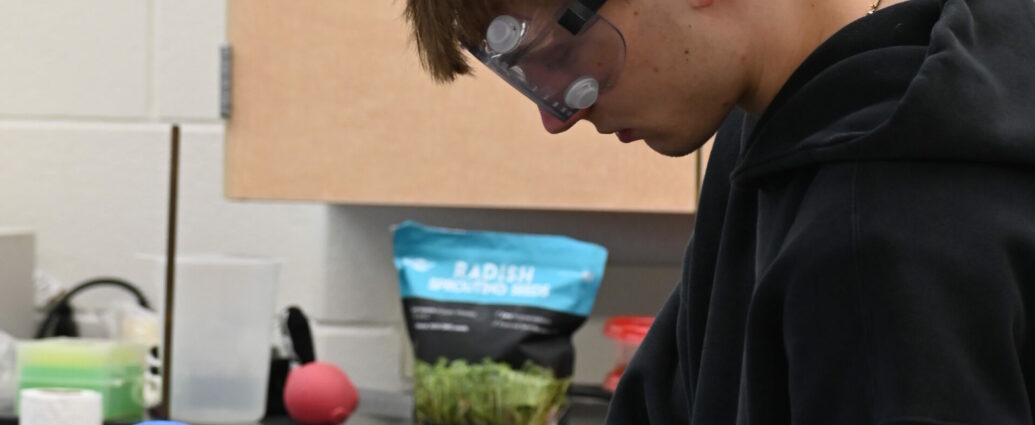This year, IB Biology 1 students can use bacteria for their Science Fair projects. Last year, the previous teacher did not allow bacterial projects.
Senior Arjun Bhide took IB Biology 1 last year and explained why he was not allowed to use bacteria.
“[My teacher] basically told us that bacteria projects are too complicated and they cost a lot of money, so that was one of the reasons,” Bhide said. “She also said something about how it was too common and she wanted more out-of-the-box ideas.”
This year, IB Biology 1 teachers Nicole Shook and Amy Camire are allowing bacteria projects. Shook commented on their experience working with bacteria.
“I’ve used bacteria in some labs that I’ve done in the past and Ms. Camire [has] done a lot of bacteria projects in the past too so we feel comfortable,” Shook said.
She noted that using bacteria does require more protocols that have to be followed.
“You have to wait over days for your bacteria to grow in broth and then you have to plate that bacteria, and then that’s another 24 to 48 hours, so there are some additional steps,” Shook said.
Despite the extra work required, Shook believes that the end result is worth it and may help students in the future.
“[For] my students doing bacteria projects, they are going to go [to college] where maybe in their sophomore year they might do a bacterial thing, and they already know what to do,” she said.
Junior Lindsay Nelson was excited to hear that she could use bacteria. She outlined what her project is this year.
“I am exploring natural remedies on bacteria. I am testing the effect of albumen on gram negative and gram positive bacteria,” Nelson said. “I wanted to find something that would be equally or more effective against gram negative bacteria that could be combined with garlic.”
Nelson’s project was inspired by her mom.
“My mom works in the medical field, so she ended up suggesting that I do something with natural antibiotics as antibiotic resistance is becoming a major global health issue,” she said.
Last year, Bhide had hoped to do a similar project targeting antibiotic resistance, but was unable to due to the restrictions prohibiting him from working with bacteria.
“I was really into the idea of doing [antibiotic resistance at first] because I’ve seen [it] in the media nowadays and I wanted to see how that would work in a science experiment,” he said.
“It was kind of sad that we couldn’t use bacteria because I couldn’t do a project that I had wanted to do.”
Bhide believes that eliminating bacterial projects made the brainstorming process even harder.
“It was insanely difficult. There’s so many ideas out there already, and to come up with one of your own that can be done in a high school setting takes a lot of work and more thinking than you would originally think,” he said.
Nelson agreed that the brainstorming process was difficult, and would have been worse if she couldn’t use bacteria.
“It definitely would have taken me longer to come up with a new idea if I couldn’t use bacteria because this idea already took me a couple weeks to come up with and I didn’t have any others that I liked,” she said.
Shook also commented on the challenges of the Science Fair, regardless of the use of bacterial projects or not.
“Coming up with a Science Fair idea, for the whole project, probably is the most difficult part of the project,” Shook said. “I always call it a productive struggle.”
While Bhide was upset that he couldn’t use bacteria, he said he understood why the previous teacher placed restrictions on the project topic selections.
“There are definitely some more challenges with using bacteria,” he said. “I also think the projects may be less creative this year since they can use bacteria.”
Shook also understands why teachers may choose to prohibit the use of bacteria.
“I think sometimes students aren’t really careful and then they waste a lot of reagents,” she said. “[This is] also the first year I’m doing it, so maybe next year I’ll look back and be like ‘we’re never doing [bacteria] projects again,’ I don’t know, but this year we are.”
Despite the change to allow bacteria projects, students are still following similar procedures in the Science Fair process. Nelson shared her enthusiasm about the Science Fair.
“I am very excited to collect my data because I’m doing something I’ve never done before,” she said. “I am also excited to analyze my data when I’m finished collecting it and have to figure out why certain things happened the way they did because I don’t know what the outcome will be.”
Shook shares that excitement and is looking forward to seeing her students’ completed projects.
“I love the energy from the Science Fair,” she said. “I think there’s this nervous energy to start, but then students get excited to talk about their project because they are taking ownership of it, and so I love Science Fair, [it’s] one of my favorite nights of the year.”

